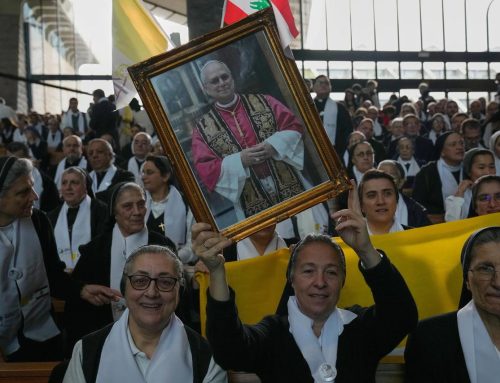Melkite Archbishop Georges Masri of Aleppo describes the dramatic impact of the on-going war in Syria, and the subsequent economic crisis and rise of the cost of living, both on the population’s health and the Church’s pastoral work.
As the eyes of the world and media continue to focus on the war in Ukraine and the subsequent energy and food crises, during his General Audience on Wednesday Pope Francis once again drew attention also to the many forgotten wars still wreaking death and destruction in many other parts of the globe. Among them, he mentioned the eleven-year conflict in Syria.
Many Syrians deprived of their basic needs as war wages on
Though currently on the backburner, fighting is still on-going in some areas between residual insurgents and Bashar al Assad’s forces supported by Russia, and the country continues to experience a serious economic crisis with sky-rocketing inflation as a result of sanctions, international isolation, destruction of infrastructure, lack of government funds, as well as the the financial meltdown in Lebanon.
The crisis is having a deep impact on Syrians, who are deprived of their basic needs, including healthcare, while those who can continue to flee the country.
Covid-19 and recent Cholera outbreak
During a recent visit to the headquarters of international foundation Aid to the Church in Need (ACN), in Germany, Melkite Archbishop Georges Masri of Aleppo, described the health situation as dramatic, with the country having suffered through the Covid-19 pandemic, only to be struck recently by outbreaks of Cholera in 13 of its 14 provinces.
The outbreak is a direct consequence of the conflict which has damaged water and sanitation infrastructure, while some 2 million internally displaced people live in over-crowded last-resort sites and camps, with very limited access to basic water and sanitation services.
The UN has reported recently that more than two-thirds of water treatment plants, half of all pumping stations and one-third of water towers in Syria have been damaged.
Syrians too poor to pay for medicines or surgery
According to Archbishop Masri, however, the problem is bigger than the epidemics, since the general health of the population is very poor. Medical issues are now one of the main worries for Christian families who have remained in Syria, he said
An increasing number of people die for lack of medication, the prohibitive cost of surgery, and the general destruction of hospitals and clinics.
The elderly are especially affected, because of the rising price of medicines, the Syrian Archbishop explained.
Doctors leaving the country
Another serious issue, he added, is the fact that many qualified doctors have chosen to leave the country, while many State-owned pharmaceutical companies have had to close.
ACN supporting local Church in relief efforts
Many families have reached the point where they opt not to buy medication, or to have any surgery, because they don’t believe they will be able to pay back their loans. Faced with this situation, the local Church, while unable to compensate for the lack of doctors, has increased its pastoral care for the sick.
ACN has supported this effort through the construction of a pharmacy in Aleppo to aid in the distribution of medicines to the population. Although owned and operated by the Catholic Church, the pharmacy is open to the general public.
Another of Archbishop Masri’s projects which ACN is funding, is the organization of social and recreational activities for elderly with less financial resources. This helps them improve their physical and spiritual health. “They return home full of energy”, said the archbishop. “One of them told the priest who was with them that it was the first time in his life that he and his wife had left Aleppo together”.
The head of the Melkite Archdiocese said he is deeply grateful to ACN benefactors, whose financial contribution has helped support the population despite the crisis.
Over 13 million Syrians in need of humanitarian relief
11 years into the Syrian conflict, almost 7 million people remain internally displaced, and over 13 million are in need of humanitarian relief, while an estimated 5,5 million have fled abroad, mainly to neighbouring Lebanon, Turkey and Jordan.
As the economic and financial crisis in Lebanon grinds on, pressures for the some 1,5 Syrian refugees in the country to return to their homeland have grown.
By Lisa Zengarini | Vatican News






